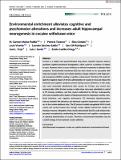Por favor, use este identificador para citar o enlazar a este item:
http://hdl.handle.net/10261/344452COMPARTIR / EXPORTAR:
 SHARE
BASE SHARE
BASE
|
|
| Visualizar otros formatos: MARC | Dublin Core | RDF | ORE | MODS | METS | DIDL | DATACITE | |

| Título: | Environmental enrichment alleviates cognitive and psychomotor alterations and increases adult hippocampal neurogenesis in cocaine withdrawn mice |
Autor: | Mañas-Padilla, M.C.; Tezanos, Patricia CSIC ORCID; Cintado, Elisa CSIC ORCID; Vicente, L.; Sánchez-Salido, L.; Gil-Rodríguez, S.; Trejo, José L. CSIC ORCID; Santín, Luis J.; Castilla-Ortega, Estela | Palabras clave: | adult hippocampal neurogenesis cocaine use cognitive impairment environmental enrichment. |
Fecha de publicación: | 2023 | Editor: | Taylor & Francis | Citación: | Addiction Biology 28 (2023) | Resumen: | Cocaine is a widely used psychostimulant drug whose repeated exposure induces persistent cognitive/emotional dysregulation, which could be a predictor of relapse in users. However, there is scarce evidence on effective treatments to alleviate these symptoms. Environmental enrichment (EE) has been shown to be associated with improved synaptic function and cellular plasticity changes related to adult hippocampal neurogenesis (AHN), resulting in cognitive enhancement. Therefore, EE could mitigate the negative impact of chronic administration of cocaine in mice and reduce the emotional and cognitive symptoms present during cocaine abstinence. In this study, mice were chronically administered with cocaine for 14 days, and control mice received saline. After the last cocaine or saline dose, mice were submitted to control or EE housing conditions, and they stayed undisturbed for 28 days. Subsequently, mice were evaluated with a battery of behavioural tests for exploratory activity, emotional behaviour, and cognitive performance. EE attenuated hyperlocomotion, induced anxiolytic-like behaviour and alleviated cognitive impairment in spatial memory in the cocaine-abstinent mice. The EE protocol notably upregulated AHN in both control and cocaine-treated mice, though cocaine slightly reduced the number of immature neurons. Altogether, these results demonstrate that EE could enhance hippocampal neuroplasticity ameliorating the behavioural and cognitive consequences of repeated administration of cocaine. Therefore, environmental stimulation may be a useful strategy in the treatment cocaine addiction. | Versión del editor: | http://dx.doi.org/10.1111/adb.13244 | URI: | http://hdl.handle.net/10261/344452 | Identificadores: | doi: 10.1111/adb.13244 issn: 1369-1600 |
| Aparece en las colecciones: | (IC) Artículos |
Ficheros en este ítem:
| Fichero | Descripción | Tamaño | Formato | |
|---|---|---|---|---|
| Addiction Biology.pdf | 2,78 MB | Adobe PDF |  Visualizar/Abrir |
CORE Recommender
Este item está licenciado bajo una Licencia Creative Commons

